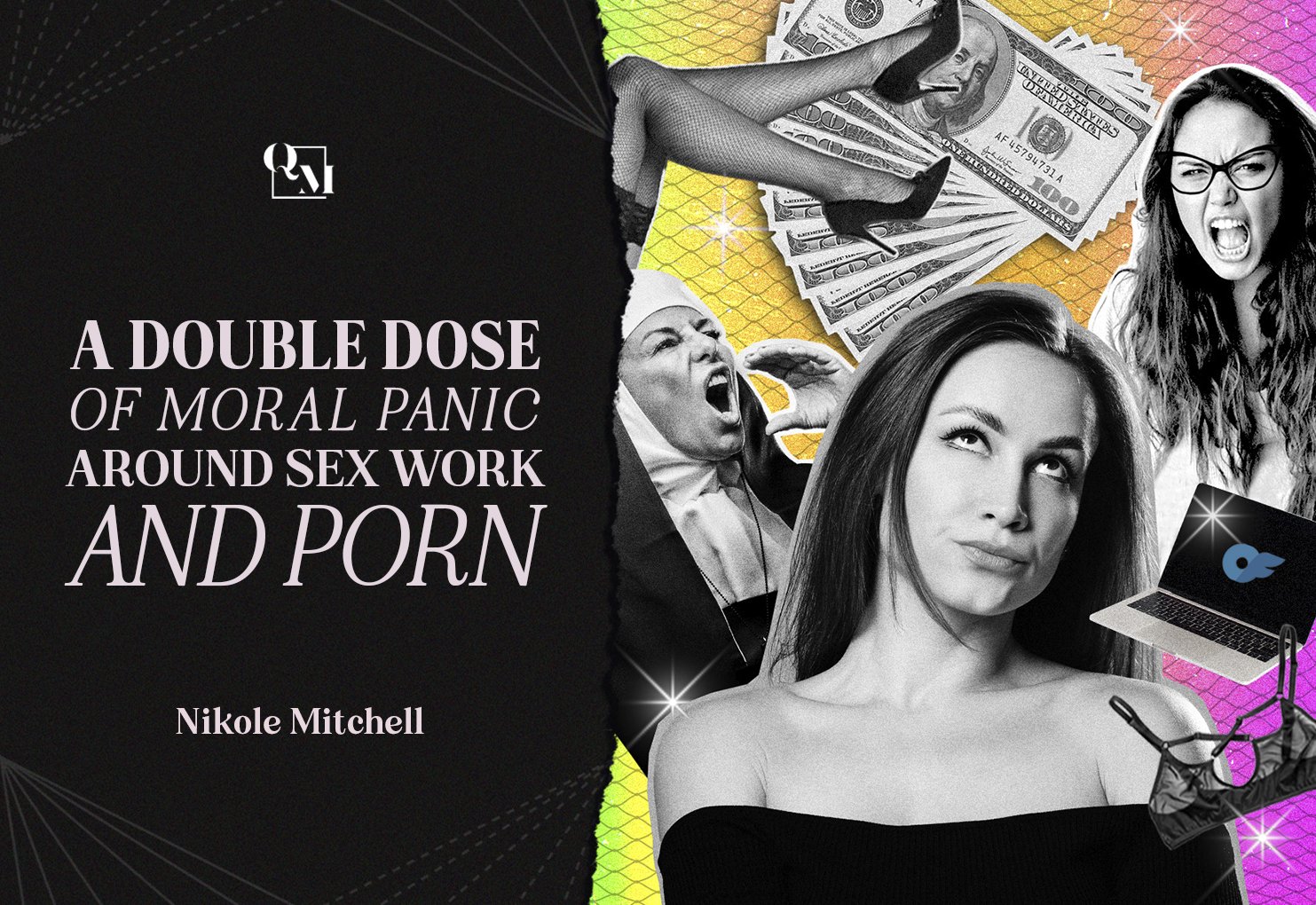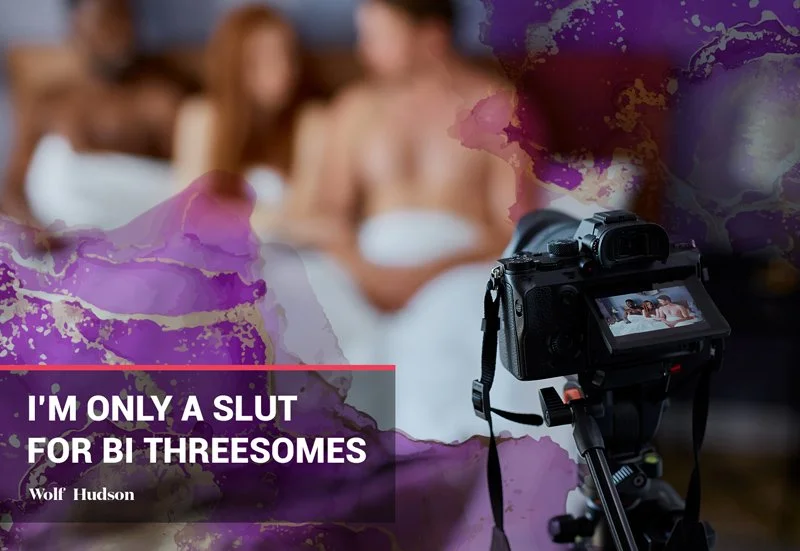A Double Dose of Moral Panic Around Sex Work and Porn
I never thought I’d be a sex worker. That was never my plan. For all appearances, I was the ideal wife, mother, and churchgoer. I even went on to become a pastor. But the truth wouldn’t let itself be buried — I was living a lie. When I left the church, moved to California, and came out as bi, I gave myself permission to start over. The more I became honest about my desires, the more I realized sex work was calling my name. At first, I tried calling myself an “Instagram model” or labeling my sex work “self-expression.” And while those descriptions were true, they were also attempts to shy away from calling my work what it really is: actual sex work. Feminism had helped me move away from the repression of the church, but now feminism left me wondering if I was subjecting myself to objectification by men and the patriarchy. I thought long and hard about my experience and decided the answer was no — but that hasn’t spared me from the angry excoriations of both Christians and feminists alike.
Christians tell me I’m ruining the very fabric of America. Feminists tell me I’ve traded repression for oppression. I expected criticism from the religious front, of course; but somehow I never expected feminists to turn on me too. Maybe I hadn’t found the right allies if the very people who purport to advocate on behalf of women’s self-determination and freedom were just as adamant as religious conservatives about stopping me in my path. In their blind rejection of all things pornographic, radical feminists have shown themselves to be just as dogmatic and closed-minded as the Christian fundamentalists I ran away from.
One striking commonality I’ve noticed is that people in both of these camps have generally done little to no research on sex work, nor have they had any conversations with sex workers, but they nevertheless deem themselves authorities on the industry. Reading through the ranting messages I often receive from Christians and feminists in my DMs, I see their fear. They fear that if a woman has full autonomy over her body, lives a life rooted in pleasure, and calls the shots on when, how, and where she expresses her sexuality, she will be out of control — out of their control. And they’re right.
We will be out of control. And it’s about damn time.
Women have been controlled for so long. Controlled by religion. Controlled by the state. Controlled by tradition. Controlled by men. And now, if they had their way, controlled by radical feminists, too. But, for me at least, those days are at an end.
Radical feminists and the religious right both have their views about what a woman is supposed to be: The dutiful housewife and broodmare, always modest, buttoned-up, and under control. Or the political activist whose worldview is oriented around fighting the patriarchy — often a smokescreen for men as a whole, including male sexuality and any way in which women enable it. Sexual liberation doesn’t fit into either of these boxes and so Christians and sex-negative feminists alike want to shut it down.
Another commonality these two groups share is a fear that anything sex-related will corrupt the youth. Many people think I must be a terrible mother for doing sex work. “How could you do that to your kids?!” is a common line I hear from both Christians and feminists. It is precisely because of my sex work that I have the important conversations I do with my kids. We talk about bodies, we read books on sexuality and boundaries, consent and pleasure, and they feel safe asking me anything. And because of that, my kids are better informed and prepared on matters of sex ed, family planning, and sexual health and ethics than just about anyone. Had I stayed religious or afraid of sex work, these conversations would never have happened. I would have been too afraid. It was only by becoming a sex worker that I realized these conversations aren’t to be feared, and my children are better off for it.
Another critique I get from feminists and Christians is that sex work ruins the family. They equate sex work with infidelity, betrayal, and heartbreak, but I have found sex work to be the exact opposite: healing, wholesome, and a way to bring couples closer together. Americans have so much shame around sex that couples have a hard time engaging in important conversations, which often results in their unaddressed issues boiling to the surface in undesirable ways: through affairs, sexless marriages, or relationships wrought with tension.
Sex work provides an open door for couples to seek out options, solutions, support, and community. It offers an outlet to talk about things they would otherwise keep buried. Sex work helped me reclaim my body, feel safe in my pleasure, and embrace life as a sexual being, and it’s helped my subscribers do the same. As a former pastor, I say without irony that sex work has truly been some of the holiest work I have ever done.
Radical feminists have a fondness for insisting that all sex work is directly linked to coercion, exploitation, and human trafficking. These are lumped together so often that people don’t realize that these are all separate issues. Sex work is not inherently dangerous or harmful. It’s dangerous primarily because of how society treats people in the adult industry. Certain aspects of sex work are criminalized here in the US, so sex workers cannot call the police or protect their rights when facing violence or discrimination. Sex workers have had their children taken away simply because of the work they do — not because they’re a negligent or dangerous parent, but because society has equated sex work with the likes of child abuse and human trafficking.
There are, of course, cases where women are forced into sex work. Sex trafficking is real, horrific, and heartbreaking. But it’s far from the norm. An exhaustive deep dive into the available data, such as it is, from writer and OnlyFans star Aella, resulted in a rough estimate that 3.2% of active, in-person sex workers in the US are the victims of trafficking. The rate for sex workers who do not meet their clients in person is likely even lower. Making the mistake of assuming that sex work itself is a form of human trafficking, as many sex-negative radical feminists do, not only distracts from the problem of human trafficking by crying wolf, it dumps yet another layer of stigma onto the vast majority of sex workers who are acting of their own volition.
There are more than three million users on OnlyFans, and 98% of all that’s available on that platform is adult content. There are millions of people who choose sex work voluntarily, happily, and ongoingly. Sex work is work. It’s for consenting adults who agree to exchange money or goods for sexual services or performances with those who know what they want and are willing to pay for it, just like we do with anything else. We use our bodies, brains, and energy to generate a living to support ourselves and our loved ones. For some of us, we choose this work because we love it and find life in it. For others, they do it just to be able to pay their bills and get by. Aren’t both true for people in conventional jobs? Our work is no different except for the stigma, misunderstanding, and misrepresentation of us in the media and in society at large.
I’m not here to tell anyone what to think, but I’d encourage people to approach “taboo” topics with more curiosity and less judgment, with a willingness to listen and learn rather than dominate the conversation. When you are outside of a situation or an outsider to an industry, it’s easy to project your thoughts, opinions, and conclusions onto others. It takes more openness and humility to see things from another’s perspective. For that, it’s helpful to bring a human face to the issue at hand — it’s more difficult to turn the person talking to you into an abstraction. That is why I’m so public about my job.
For too long, sex workers have had to hide what they do. We hide to protect our day jobs, relationships, children, and our own well-being. For so long our work had to stay undercover and hidden from the law. But what stays in the dark can breed shame, fear, guilt, and isolation — not to mention greater dangers for women.
As I write this, I realize how fortunate I am that all of my sex work is done online. I am physically safe, I choose my hours, I choose my rates, and I am fully in charge. There isn’t really a middleman (except for online platforms’ fees and terms and conditions). For sex workers who work in clubs, on the streets, or in person, their work comes with more risks, not so much because of the job itself but because of how people treat them. Yet when Christians and feminists hear of sex workers being attacked or harmed, they seemingly can only think to declare all sex work evil, exploitative, and deserving of being stamped out (as if the world’s oldest profession were ever going to disappear). Or they blame the victim and assume sex workers deserve mistreatment because of the career they chose.
I love that I live in a conservative county in California. When people meet me, they assume I’m a nice, Christian, suburban mom. When they find out that I’m a sex worker (and not a Christian), you can see the gears of cognitive dissonance grinding in their brains. They know me, they like me, and they trust their kids with me, but I do the very work they’ve been taught to fear, judge, and avoid at all costs. And yet here we are — friends, living in the same neighborhood, with our kids playing together.
This confrontation with reality forces them to recalibrate their understanding of sex work and how sex workers look and act. The truth is, we are everyday people. We are your neighbors, coworkers, siblings, and best friends. We do our jobs, make money, and take care of our families. Just like you, we have good days at work, bad days at work, and need vacations from time to time. All of us have far more in common than we have differences. If people only took a moment to learn about sex workers and trust in our freedom to choose for ourselves, instead of infantilizing us into a victim class of porcelain dolls or an underclass of degenerate harlots, it would transform the entire conversation into something that might actually prove productive. There’s a discussion to be had about how to make society a freer, safer, and fairer place. Going to war against sex work, porn, and consenting adults isn’t how we get there.
Published Jul 5, 2023








